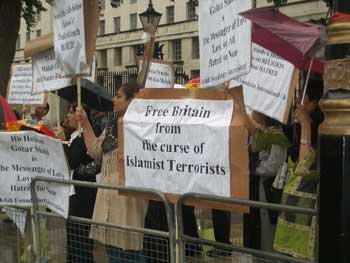
The best solution to terrorism is to lock them all up!
By Charlotte Carding
Despite the very clear title of my article – which, for reference, I do not believe in – this topic is not simple. Radicalisation is an issue that we face in today’s societal and political climate, prominently since 9/11 and the Western world’s’ ‘War on Terror’. There are, however, many intricacies to an issue like this.
Before 2001 the term ‘radicalisation’ was rarely mentioned in the media, its use was generally restricted to academics. Since the growth of ‘home-grown’ terrorism seen in Western Europe, however, the term has been increasingly utilised in public discourses, along with a surplus of counter-radicalisation programmes that I feel we are all quite familiar with (Sedwick, 2010). There may be a widespread belief that the only solution to terrorism is imprisonment or even the death penalty, and that terrorism is innate to certain groups. I want to argue, though, that this is not the case, that radicalisation can be stopped before it even begins, and that the key to this lies within our own Western society and our governmental actions and policies.
An example of the levels of governmental action that can impact society is the Danish government’s action plan for counter-radicalisation in 2009. This multifaceted approach pinpointed seven areas of intervention with 22 policy initiatives: direct contact with young people, inclusion based on rights and obligations, dialogues and information, democratic cohesion, efforts in vulnerable residential areas, special initiatives in prisons, and knowledge, cooperation, and partnerships (Lindekilde, 2012). This action plan sought to gain ground against radicalisation and terrorism through a number of policies, including targeting schools and prisons. A study was then completed by Lindekilde to investigate the opinions of young Muslims who may be affected by this action (2012). The majority of the participants believed that the term ‘radical Muslim’ was too broad and inclusive, with the phrase ‘suspect community’ being thought to do what labelling and framing do, leading to isolation and to suspicion of the authorities within these communities, further directing them to possibly wanting to partake in radical activity (Lindekilde, 2012).
Lindekilde further looks at how misrecognition is a cause of radicalisation, a concept that many of us would not have heard of before (2012). Stigmatisation is a form of misrecognition, this is a concept of identity building, something that we all do, in three spheres: private, legal, and solidarity, where we need recognition in the whole of society otherwise we would have an identity crisis (Lindekilde, 2012). This demonstrates how stigmatisation and assimilation pressure may have unintended consequences, individuals can come together and define themselves in opposition to society, leading them to wanting to isolate themselves, becoming more vulnerable to radical and alternative ideas.
We can also ask ourselves why we don’t see a lot of Muslim actors in public debate, as Lindekilde infers, Muslim actors in public debate are increasingly expected to proactively endorse certain liberal democratic values and reject others, possibly even feeling that they must reject their faith and culture (2012). This then leaves the floor for radicals who have nothing to lose by e.g. being identified as Muslim, leaving these potentially dangerous radicals unquestioned as alternative voices withdraw themselves. This can be highly counter-productive to society as governmental policies, and the way we act in society, can lead to individuals isolating themselves because we view them as an ‘other’, and renounce them from our society.
Therefore, we can assume that the best approach to countering radicalisation in our societies is by involving everyone in our society, so that no one feels isolated and may lean towards radical ideas that could harm us. Governments use many models as to their methods of minimising radicalisation, however, I feel that there is no model that is less powerful than having minimising prejudices against people to evolve into a more loving and equal society. If we as society, and as individuals, become more accepting of different cultures, races, religions etc. we can help reduce radicalisation as those who may be vulnerable will not be isolated in the first place. Thus, I believe that locking all those up in prisons who may potentially harm us is not a solution, and just increases hate, we must love one another for a better and more peaceful future, don’t you agree?
BIBLIOGRAPHY
- Lindekilde, L. (2012) ‘Neo-Liberal Governing of ‘Radicals’: Danish Radicalization Prevention Policies and Potential Iatrogenic Effects’, International Journal of Conflict and Violence, 6(1), pp.109-25
- Sedwick, M. (2010) ‘The Concept of Radicalisation as a Source of Confusion’, Terrorism and Political Violence, 22(4), pp.479-94

0 Comments